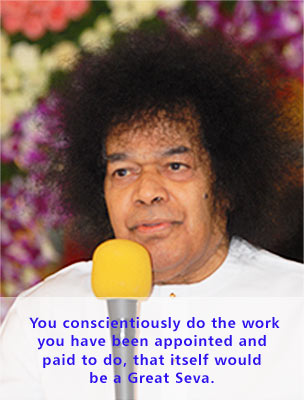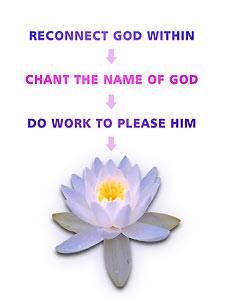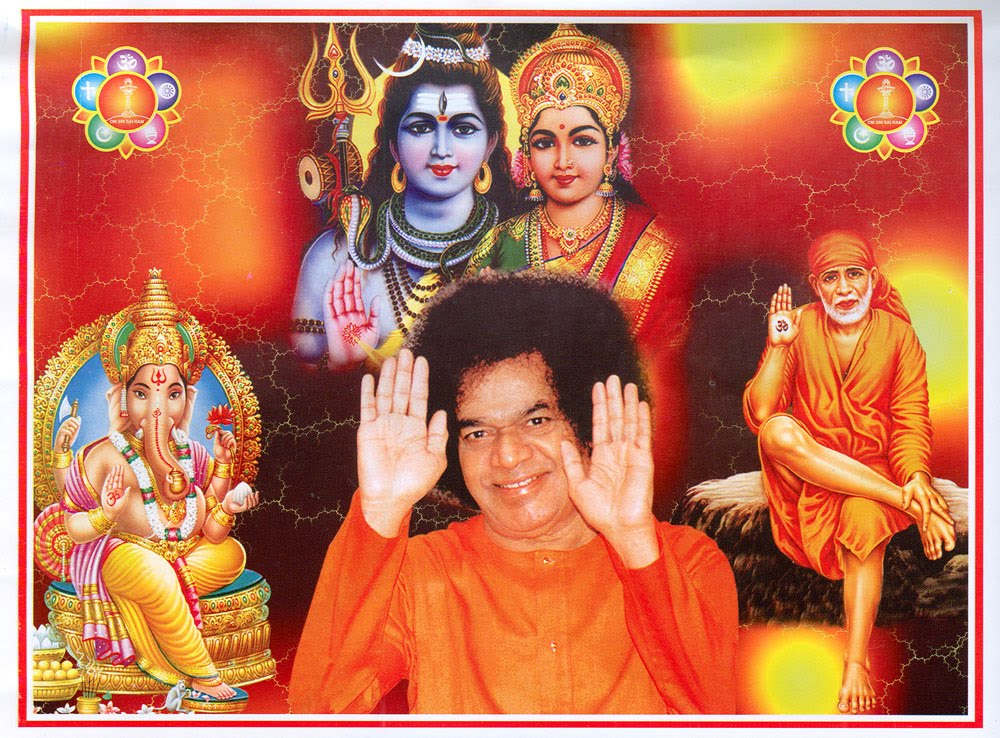|
|
Loving Sai Ram, and greetings from Prashanti Nilayam. Welcome once more to our Radio study circle in which I answer your questions. Today I have at least three questions before me and with luck I might be handling a few more; let us see how it goes. Meanwhile, I do hope you are benefiting from this special program from us.
Today’s bag brings us three questions and they are as follows:
QUESTION 1: How can we build up a good character?
QUESTION 2: Which is better, doing spiritual practices or doing one’s duty?
QUESTION 3: What is the main purpose of life?
QUESTION 1:
How can we build up a good character?
ANSWER:
Unlike in earlier programs, this time the questions are not quite linked, at least, that is what I think. That, however, does not mean they are unimportant! Indeed, the first question is very vital in today’s situation, and so, let me turn to it first.
 | |
Character is not taught from without, it is fostered from within |
What is character? Surely, this word ‘character’ can be described in many ways, but I shall do so by describing what one would normally expect from a person of good character. First and foremost, we would expect such a person to be honest and truthful, always be true to the given word, never indulge in deceitful practices, etc.
In general, we all have an intuitive understanding of what a person of good character is supposed to be like – no problem there. And by the way, whatever it be, good character means good character and nothing else, and its description should thus hold across the board for people of all faiths, and indeed, also for atheists.
In the first question, the questioner wants to know how to build up a good character. This implicitly means that character is built upon something, a foundation; clearly, that foundation must be strong and not weak, for otherwise, under difficult and testing circumstances, the so-called good character might abandon the person. Indeed, steadfastness and uncompromising adherence to basic principles is one of the hallmarks of a person of good character
The question now shifts to the foundation; how to build the foundation? It may surprise you to know that we really do not have to lay any foundation because it is already there! How can that be? How could that have come into existence without any effort? No house gets a foundation just like that; somebody has to lay the foundation. Very true; in this case, it is the Good Lord, who has already done that for us, laying the foundation I mean! I am sure you are feeling dazed, and so, let me explain what exactly I mean.
Let me put it this way. We all have heard Swami telling us repeatedly that we are the Embodiments of the Divine. Swami has also told us that Sathya, Dharma, Shanti, Prema and Ahimsa are the fundamental and eternal values in-built into each and every one of us, even as we are sent forth into this world to start our journey through life. These fundamental values encoded into us are, in fact, the Seal of the Divinity latent within us.
Swami has also told us that the Sathya, Dharma, Shanti, Prema and Ahimsa are the fundamental and eternal values in-built into each and every one of us, even as we are sent forth into this world to start our journey through life.
So my first point is: We do not have to bother about building a foundation; it is already there, and believe it or not, God Himself has laid the foundation. And let me remind you once more, that the foundation consists of the five basic human values that I listed out a short while ago. Good Character is the name given to the superstructure of behaviour that is built on these values.
The question now becomes: “If we already have a foundation given to us in fact by God Himself, why then does building up a good character seem so difficult?” Now that is an interesting question and needs some discussion.
Let us say you have bought a plot that earlier belonged to someone else, and that the previous owner had already laid the foundation for a house he wanted to build. However, he could not, for various reasons, build the house and sold the plot to you with merely the foundation. You are now the owner, and looking at the foundation, you say to yourself, “Hey, I like this layout, and maybe I shall build on it the house of my dreams.”
 | |
How is the house our your character built? |
That is fine. You have a plot and also a good foundation, but what happens if the fellow who builds your house uses substandard methods and gives you a house that has defects all over the place? You, of course, get into all sorts of troubles. There is heavy seepage through the walls when it rains, the roof leaks, the wiring is faulty, the toilets do not work, etc.
What this tells us is that if we want a good house, then we must not only have a good foundation but also make sure that the superstructure that is built is of good quality and is robust. In turn, this means that one must use the right building materials, follow the right building procedures, and take all the necessary precautions while constructing the house.
Let us take over the lessons from this illustration to the discussion about character development. Many people – this includes both parents as well as some teachers – think that good character can be instilled simply by drilling and saying, “Hey kids, you must always speak the truth, you must never cheat,” and so on. Yes, drill is an essential part of the overall training and cannot be dispensed with. However, mere drilling alone is NOT enough. So, in that case, what more is needed?
Children must be slowly but surely exposed to the fact that the foundations for good character are already latent in them, having been put there most thoughtfully by God well in advance. Elders could possibly say, “Dear children, do you know God sent you to live on earth with a box full of precious jewels and ornaments? They are called Sathya, Dharma, etc. God would be very pleased if you wear them. Make sure you keep these gifts of God in good condition. They must be kept polished and their shine and lustre must dazzle,” and so on.
I am not making this up. Many years ago, I met a devotee from Brazil who was closely connected with education there. He told me of an interesting incident in a school, which had adopted the EHV (Education in Human Values) approach to education. Apparently, in one class, there was a boy who was a sort of terror; smart kid, but very unruly and always creating trouble.
The teacher tried her best but the boy was just too difficult to handle. One day, just before the silent sitting class, the teacher called the boy near her and whispered something into his ear. That day, the boy sat silently and did not make even the slightest noise. Not merely that; from that day, the attitude of the boy changed completely, and soon he became not only an ideal boy in his school, but a national icon! Imagine that!
When I heard this, I was filled with curiosity, and was dying to know what magic mantra did the teacher whisper into the ear of that boy? I asked my Brazilian guest and with a smile he replied, “The Teacher said softly to the boy, ‘Boy, everyone thinks you are bad kid; I know that is absolutely wrong. Just show them what a fine and wonderful boy you are and shame them!’”
 | |
Developing good character is about choosing to bring out what God has miraculously put within us |
That worked! Now how was this rowdy kid suddenly able to become so disciplined? Because unknown to him, he silently drew upon the huge reserve of goodness latent within. In short, he brought what was already inside – that is really what character development boils down to: bringing out and making patent what is already latent within, what has been already put there by God Himself as His loving gift to us.
Let me add emphatically that God does not send out a single human being into this world without this treasure. It is a different matter if people remain ignorant about it, or are indifferent to it, even when they know they have this wonderful treasure.
So, the point really is that the first step in character development is for each and everyone of us to realise that WE ARE IN FACT INTRINSICALLY DIVINE, even though our externals might not suggest that. However, with some vigorous “scrubbing and polishing”, many a “bad” person has completely turned around, which is why they sometimes say that yesterday’s sinner is today’s saint, and today’s sinner is tomorrow’s saint. This “scrubbing” as I called it, is what Sadhana is all about.
Please understand that what I have just pointed out is something non-trivial. In the context of today’s situation, where the jails in most countries are overflowing and huge sums are spent by the state in building new prisons and in maintaining the prisoners at taxpayers' expense, few realise how thousands of prisoners can be easily rehabilitated back into Society, if only we spent time in caring for them, showing them love and compassion, and dealing with them humanely instead of treating them as beasts. If we take the Divine Spark in each and everyone seriously, then the world would be a better place.
...character development boils down to: bringing out and making patent what is already latent within, what has been already put there by God Himself as His loving gift to us.
By the way, I am not talking through my hat. No less a person than Kiran Bedi, India’s top female cop as newspapers often describe her [now retired, and winner of the Magsaysay Award], was once put in charge of the Tihar Jail, India’s most famous jail if I may say so, located in the capital city, Delhi. Built to hold 4000 prisoners, it held 14,000 when Kiran Bedi took charge, and it included terrorists, convicted murderers, and all sorts of tough guys.
It was a horrible job, but during her term, Kiran Bedi managed by introducing a spiritual atmosphere that included bhajans and all that. Now, how come all these hardened prisoners responded well? Because there was goodness latent in them. Till Bedi arrived, no one had ever dreamt that beneath all that external toughness there might be goodness latent within. Kiran Bedi showed that this latent goodness could be tapped and some peace brought to an otherwise difficult environment.
Winding up my answer to the question I started with, let me now make it concrete by restating it as a step-by-step procedure as follows.
How to ensure that? Swami Himself has given the recipe; He says:
 |
 |
 |
 |
I am sure that would do it. Finally, let me remind you of an old saying, according to which, character is what you do when no one is looking! Well, no human might be looking and there might not be a surveillance camera either; but someone is always looking and that someone is God.
How come God is everywhere and is able to look at all the people all the time? Very simple – God installs Himself in everyone, which makes it every easy for Him to know what we are doing. Thus, if we really love God and really understand that He is watching us every single second, we would begin to resonate with Him so much, that good character would come to us most naturally!
So you see, it is not all that difficult, provided we make an earnest try. By the way, if you are a teacher or a parent or both, make sure those under your care get a good grounding in loving God, for if they do, they would automatically abhor doing anything that would displease God. And when you put them on that track, character emerges automatically.
I now turn to the second question, which is:
QUESTION 2:
Which is better, doing spiritual practices or doing one’s duty?
ANSWER:
I find this question a bit puzzling because the term Spiritual practices is not defined. Anyway, interpreting that word as people normally do, I shall proceed to answer this question. First and foremost, let me emphatically state that doing one’s duty in the proper manner and in the correct spirit is, in fact, the foremost amongst so-called Spiritual practices. In this context, I recall a stirring Discourse that Swami gave in March 1999, when He was making a brief visit to Delhi after about eighteen years.
Speaking to a large crowd in front of the Sri Sathya Sai International Centre that had just been blessed by Him – and the crowd included not only luminaries like the then Prime Minister but also hundreds of Government servants, Swami said [in effect]: “People think that one must do Seva in order to redeem oneself. Yes, Seva is indeed a very good Spiritual Sadhana because it cleanses you. However, do not imagine that you have to pick up a broom and sweep a village street in order to do Seva. If, on the other hand, you conscientiously do the work you have been appointed and paid to do, that itself would be a great Seva.”
 |
I was present when Swami spoke those words, and it had an electrifying effect on me. Do you know why? Because, for decades, I had seen how thousands of public servants regard it as a matter of right just to waste their time and do their work most causally or not do it at all. Back in the fifties when values were still held to be important in every household, people worked hard, be it in the schools or in the hospitals or office or whatever.
Subsequently, however, massive degeneration occurred in public life [thanks to many factors, both global and local], work culture deteriorated rapidly, and people began to forget that there were obligations and duties that one had to perform. By the way, in earlier times, duty was held to be prime, not only in India where it was enshrined as Karma Yoga, but also in the West. In fact, in London there is a statue of Lord Nelson who was famous among other things for his statement: “England expects every man to do his duty.” And let us not forget that the Gita is all about duty.
All this might still leave our questioner unsatisfied. So, let me add some footnotes. Duty is a word that is sometimes interpreted in a narrow sense; so let me use instead the word responsibility, which subsumes the word duty. Seen in this sense, we have many responsibilities, and doing the work assigned to us by our employer [which is how the word duty is sometimes interpreted] becomes just a small part of one’s overall responsibilities.
The ancients of India stipulated many such responsibilities that included one’s obligations to one’s ancestors, one’s parents, to society, to Nature and so on. And there were rituals associated with all these; so, in the olden days [when life was very different], performing duty meant also performing all the stipulated and prescribed rituals.
Times have changed and we have to adapt, but only after keeping the basic principle intact. Thus, when one has, say a sick parent, and one is torn between attending to the parent and performing on time the daily puja or ritualistic worship at the family altar, God’s choice is clear: He would say [as He did via the famous story of Pundalika], serve your parent thinking that your parent is Me; that is better than worshipping an idol thinking it is Me. This is where making a right choice, exercise of proper discrimination or use of buddhi as Swami would put it, come in.
In short, if by Spiritual practices one means ritualistic worship, I would say follow Swami who advises us to elevate work itself into worship; that, incidentally, is also the essence of Karma Yoga, one of the cornerstones of the Gita. I hope I have managed to convey the point.
This brings me to the last question slated for today, which is:
QUESTION 3:
What is the main purpose of life?
ANSWER:
Actually, I have already raised this question myself in the earlier broadcasts, even though the question itself had not been posed. And having raised the question earlier, I have also answered it. I shall therefore not go over all that once more. However, since the question has been formally asked, I am obligated to give some response, which I shall now proceed to, but briefly.
| |||
Tibetan Thangka painting depicting cycle of birth/death - mergence or Nirvana (liberation) is depicted at the centre |
Basically, God gives life in human form so that we use life to go back to God. As Swami has told us, from God we come and to God we must return. It is somewhat like the water cycle. As we all know, on account of the heat radiated by the Sun, water in the ocean evaporates and first goes up as water vapour.
In the upper atmosphere, the vapour turns into clouds, which are then carried inland by wind. When the clouds encounter tall mountains, they come down as rain, and the water then starts flowing down slopes to lower regions.
While some of the water directly flows into rivers, and thereafter, reaches the ocean, thus completing the cycle. The rest of the water gets trapped in lakes and so forth, or just seeps into the ground where it often accumulates in aquifers.
The water, thus trapped, is of course very useful to us, and in course of time this once trapped or locked up water slowly finds some route or the other back to the sea, thus completing the cycle but in a delayed fashion.
It is the same with humans; they are born, they die when they live out their lives, are born again, die again and so on it goes. This cycle slowly converges only when humans make the effort to enhance their spiritual purity; it is only when humans become pure that they can merge back with God and thus escape the recurring cycle of birth and death. Hence, if one wants to get back to God quickly – and that is what all must aim at – then life must be spent largely in removing the spiritual contamination acquired in all the previous births.
In short, the purpose of life is to do all we can to live in such a manner as to put an end to the recurring cycle of birth and death and merge once and forever with God.
In short, the purpose of life is to do all we can to live in such a manner as to put an end to the recurring cycle of birth and death and merge once and forever with God. As Swami says, humans are born so that they may not be born again, and when they die it must be the very last time they do so. By the way, animals cannot achieve this [except perhaps in exceptional cases]; humans alone can because they have been given the capacity to cognise God and to yearn for Him.
I think I have said enough and also given you enough to think about! So, maybe I shall end here, with the hope that you liked what you heard and would join me again next week at the same time to continue further with questions and answers. Till then, all the best.
Jai Sai Ram.
(To be Continued...)
Dear Reader, how do you like this series? Does it help you in any way? Do you have any spiritual questions which need clarification? Please feel free to write to us at h2h@radiosai.org mentioning your name and country. Thank you for your time.


























No hay comentarios :
Publicar un comentario